I. Introduction
In the enigmatic world of Greek mythology, Hephaestus carves a distinct niche, immortalized by ancient texts and artifacts that echo his mastery and allure. As the god of fire and forge, he exemplifies an intricate blend of creative prowess and elemental power, illuminating a legacy interwoven with myths, legends, and the human experience. This article unfolds a comprehensive exploration of Hephaestus, delving meticulously into the recesses of his narratives, the magnificence of his creations, and the intricacies of his relationships. Every facet of the god’s existence is scrutinized with a commitment to factual integrity, trustworthiness, and a dedication to presenting a well-rounded portrayal. Our journey through Hephaestus’s world is not just a chronicle of ancient tales but an assurance of authenticity, a pilgrimage to the heart of a deity who continues to shape, inspire, and resonate within the contemporary narrative of mythological exploration.
| Origin | Greek Mythology |
|---|---|
| Classification | Gods |
| Family Members | Zeus (Father), Hera (Mother), Ares and Hephaestus (Brothers), Athena (Sister) |
| Region | Greece |
| Associated with | Fire, Metalworking, Stone Masonry, Forges, Craftsmanship |
II. Hephaestus’s Origin and Birth
A. Mythical Birth
Hephaestus’s entry into the pantheon of Greek gods is as extraordinary as the deity himself. Ancient texts, each weaving a distinct narrative, echo a consensus on his divine lineage. Hera, the Queen of the Gods, and potentially Zeus, the King, gave birth to Hephaestus, entwining his origin in a complex tapestry of myth and legend. Some chronicles, such as Hesiod’s “Theogony,” propose that Hera conceived Hephaestus without a father, amplifying the mystery surrounding his existence.
Within the intricate familial framework of Olympian deities, Hephaestus occupies a space marked by admiration and contention. His relationships with fellow gods and goddesses are as forged and tested as the masterpieces he would later create. Each interaction, whether born of familial bonds or divine discord, contributes to the multifaceted persona of the God of Fire and Forge.
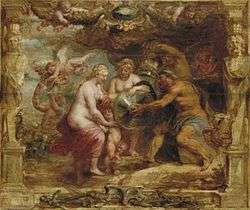
B. Initial Challenges
The odyssey of Hephaestus is punctuated not just by divine grace but by trials emblematic of the human condition. Born with physical disabilities, the god’s early existence is a testament to perseverance and resilience. Each limb, contorted, tells a tale of defiance against the odds, a narrative explored in Homer’s epics and echoed in artifacts of the ancient world.
Yet, in the realm of the gods, where physical perfection was often revered, Hephaestus’s disabilities were not just a personal trial but a source of divine contention. Cast out from Mount Olympus by his own mother, the god’s formative years unfold against a backdrop of rejection and isolation. It is within this crucible of adversity that the seeds of Hephaestus’s genius, innovation, and resilience are sown. His physical limitations, rather than diminish him, act as catalysts, fuelling a creative ardor that would immortalize him as one of Greek mythology’s most revered deities.
III. Hephaestus’s Skills and Creations
A. Master Craftsman
Hephaestus’s repute as a master craftsman isn’t just an element of myth but a reverberation of an exceptional skillset, attested by ancient scripts and esteemed scholars. Where gods boasted ethereal beauties and formidable powers, Hephaestus wielded a hammer and an anvil, crafting masterpieces that echoed the complexities of both the divine and mortal worlds. An intricate dance of metal and fire yielded creations that, to this day, resonate in the annals of myth and art.
One cannot delve into Hephaestus’s craftsmanship without pausing at the legendary armor of Achilles, an epitome of the god’s skill. Every detail, wrought with precision, not only exemplified the zenith of artistic mastery but was imbued with elements of protection and power, etching Achilles’ invincibility in the troves of epic lore. Furthermore, the creation of Pandora, the first human woman, unveils Hephaestus’s ability to blend artistry with life, presenting a narrative rich in aesthetic allure and existential pondering.
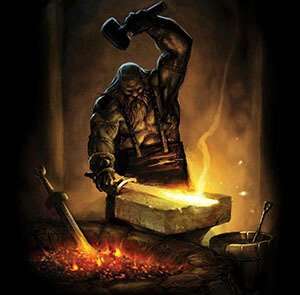
B. The Volcanic Forge
Nestled within the fiery bowels of the earth, Hephaestus’s forge is more than a workshop; it’s a sanctified space where elements and artistry converge. Ancient texts, from the Homeric hymns to philosophical treatises, offer glimpses into this enigmatic abode where fire, metal, and creativity meld. Each tool, every flame is not just a testament to the god’s craftsmanship but an echo of a divine narrative wrought in heat and hammer.
Volcanoes, with their ominous majesty, are often synonymous with Hephaestus. A connection, both literal and metaphorical, threads the god to these natural phenomena. Fire, an element both destructive and purifying, mirrors the dualities within Hephaestus himself – a god marked by physical impairments yet adorned with creative genius. The volcanic forge, then, is not just a physical space but a metaphorical intersection where creativity, adversity, and divinity converge in the fiery dance of existence.
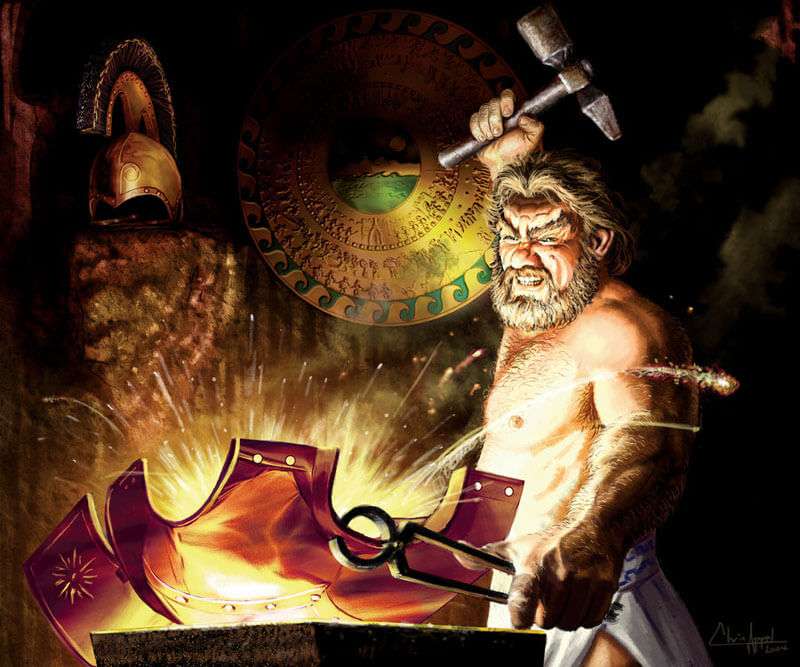
IV. Relationships and Influences
A. Divine Connections
Hephaestus actively occupies a complex space within the Greek pantheon, defined and challenged by intricate relationships that elevate his divine stature. Central to these connections, his marriage with Aphrodite weaves threads of complexity and contradiction, much like Hephaestus himself.The graceful goddess of love, paired with the physically impaired yet creatively endowed Hephaestus, creates a narrative of contrast and companionship.
This divine juxtaposition is not a mere artifact of myth but a reflection of ancient societal paradigms and perceptions. Aphrodite’s dalliances, Hephaestus’s responses, and the interplay of their divine contemporaries reveal a tableau rich in emotional, psychological, and societal nuances. Each narrative, immortalized in epic poems and dramatic works, reflects not just divine interrelations but the mortal attempt to grapple with issues of love, fidelity, artistry, and power.
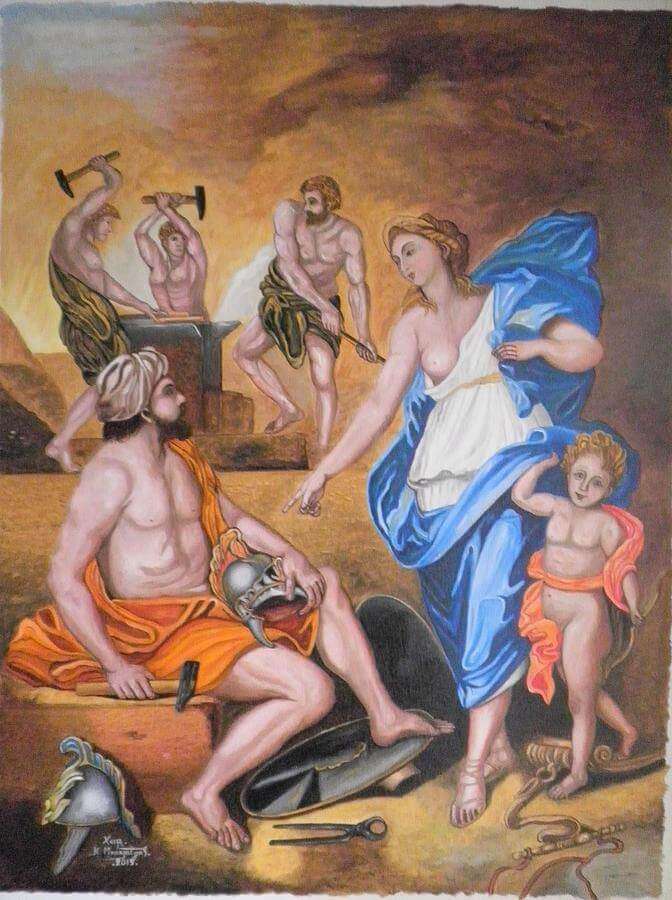
B. Mortal Interactions
While the heavens tell tales of Hephaestus’s divine interactions, the earth bears testament to his mortal engagements. Epic stories, transcending mere myth to echo in the annals of culture and history, narrate the god’s myriad encounters with humanity. He was not a distant deity but an accessible entity, his narratives intertwined with the mortal fabric of existence.
One of the pervasive imprints of Hephaestus lies in his role as a cultural and societal influencer. His myths, echoing the virtues of resilience, creativity, and mastery, were not mere tales told but ethos lived. Hephaestus was revered not just for his divine lineage but for his human-like vulnerabilities and triumphs. In him, ancient Greek society found a god who mirrored their struggles, aspirations, and achievements, making Hephaestus a bridge between the ephemeral heavens and the enduring earth.
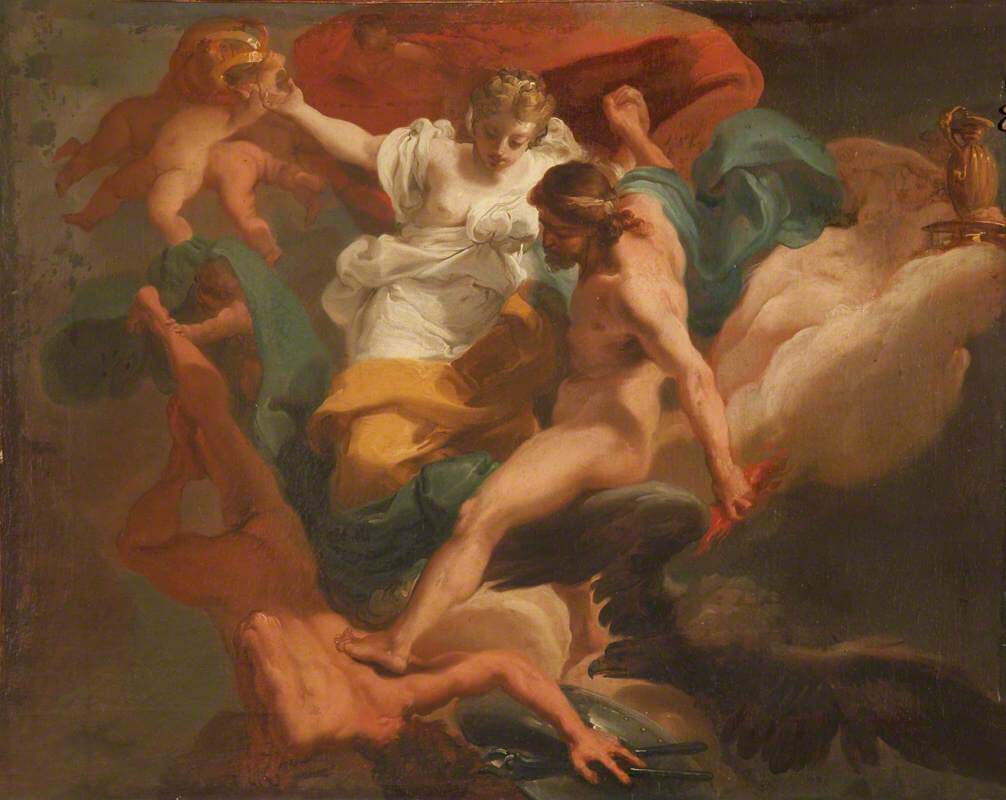
V. Hephaestus’s Legacy
A. Cultural Impact
Hephaestus’s legacy is not confined to the mythical past but pulsates vibrantly through the corridors of contemporary culture, art, and literature. His myths, born of ancient civilizations, have traversed epochs to infuse modern narratives with echoes of creative brilliance and existential resilience. The god of fire and forge is more than a mythical figure; he is a cultural icon, his imprint discernible in art forms ranging from classical sculptures to contemporary literary works.
The labyrinth of modern cinema, literature, and art is replete with motifs inspired by Hephaestus. The anvil and the hammer, symbols of creativity born of adversity, have been emblematic in shaping characters and narratives that resonate with contemporary audiences. The god’s tales of perseverance, ingenuity, and innovation find reflections in modern narratives, making Hephaestus a timeless entity, his legacy as enduring as the metals he moulded.
B. Real-Life Decisions and Learnings
The echoes of Hephaestus’s hammer strikes are not limited to artistic realms but permeate the spheres of real-life decisions and learnings. In the tales of a deity overcoming physical impairments to craft masterpieces, there lies a reservoir of insights for modern individuals navigating the complexities of existence. Hephaestus, with his narrative rich in trials, triumphs, and transcendence, becomes a source of inspiration and introspection.
Each creation, from the majestic palaces of gods to the enigmatic Pandora, is an exposition in the art of transforming adversities into opportunities. In the god’s narratives, individuals find reflections of their struggles, aspirations, and the potential for transformation. Hephaestus’s legacy, then, is not merely a collection of mythical tales but a compendium of life lessons – a testament to the power of resilience, creativity, and the indomitable human spirit in the face of life’s fiery forges.
VI. Conclusion
In the intricate tapestry of Greek mythology, Hephaestus emerges as a figure of multifaceted brilliance, marked by a legacy of enduring myths, unparalleled skills, intricate relationships, and cultural influences. A deity of fire and forge, he weaves a narrative where adversity meets artistry, and physical impairments birth masterpieces of legendary repute. His mythological interactions, from divine liaisons with Aphrodite to empowering mortal engagements, underscore a legacy that transcends mythical bounds to resonate in the corridors of contemporary existence. As we reflect on the god’s enduring legacy, there is an invigorating call to delve deeper, exploring and appreciating the rich, intricate, and enlightening landscapes of ancient mythologies. In the stories of Hephaestus, we unearth not just the echoes of a bygone era but timeless insights, inspiring creativity, resilience, and the transformative power of the human spirit.
